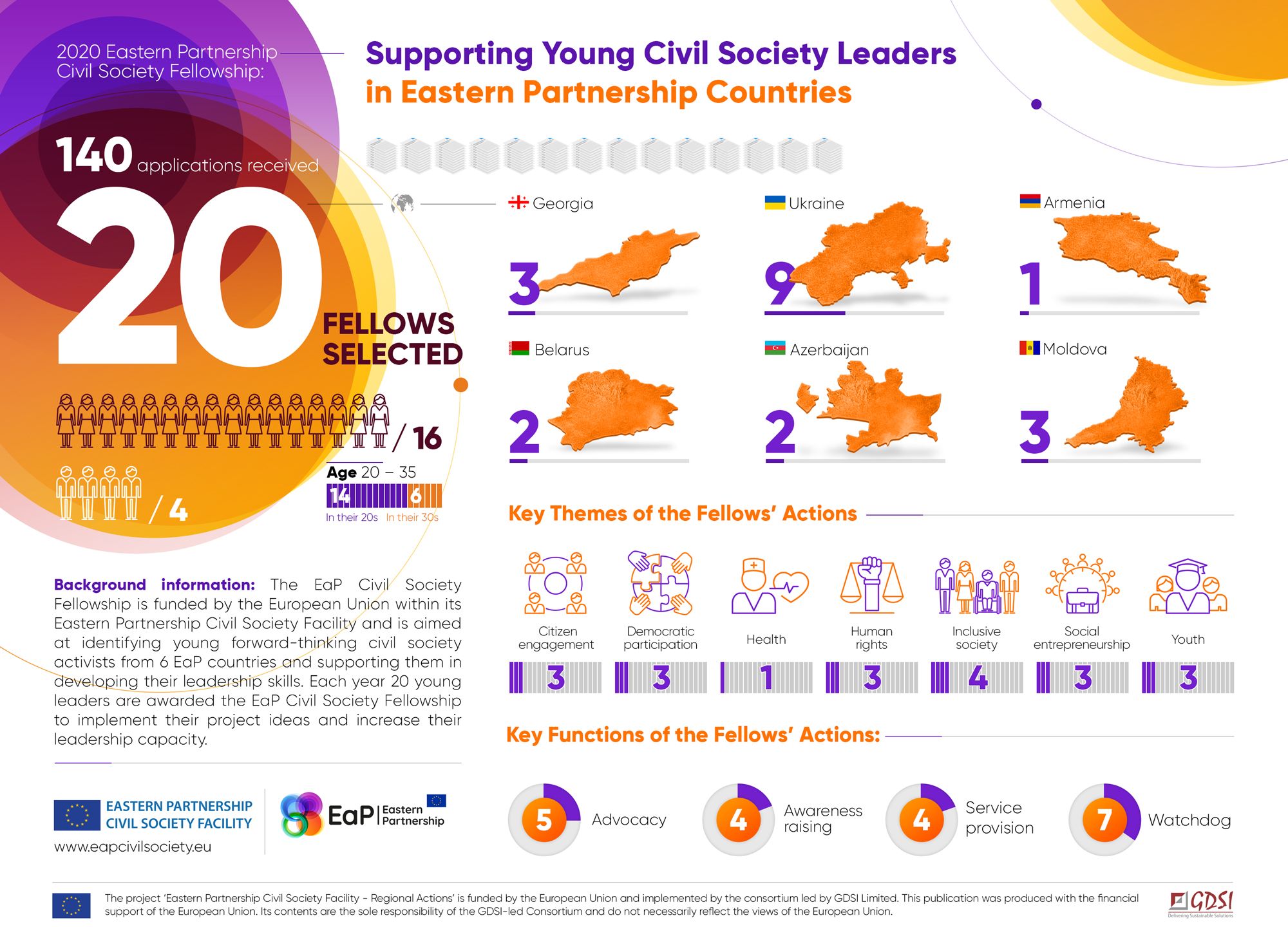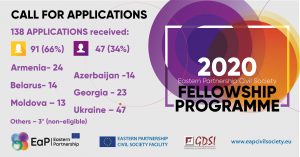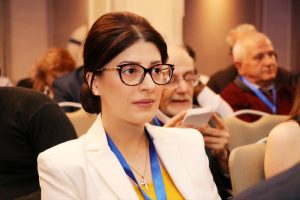
The EaP Civil Society Fellowship is funded by the European Union within its Eastern Partnership Civil Society Facility and is aimed at identifying young forward-thinking civil society activists from 6 EaP countries and supporting them in developing their leadership skills. Since 2017, twenty best programs presented by young civil society activists from Armenia, Azerbaijan, Belarus, Georgia, Moldova and Ukraine are being selected at each stage of the program and awarded fellowships to their authors.
Fellowship Programme provide an opportunity to implement the ideas of young leaders that lead to positive changes in their country, community and contribute to the development of civil society. In 2020, preference has been given to those applicants who aimed to fulfill a watchdog function thus contributing to raising the accountability of government, as well as state and community institutions; to reveal the implementation process of national and international commitments; promote active public participation in planning and/or expenditure of public budgets and in the definition of budgetary priorities at the local or national level; revealing abuses of civic and human rights, adherence to labour and social rights, quality of public services.
This year, 140 applications from 6 EaP countries were received in the framework of the 2020 Fellowship Programme. 47 of which were from Ukraine, 24 from Armenia, 23 from Georgia, 14 from Belarus, 14 from Azerbaijan, and 13 From Moldova. As a result of the final selection, 20 fellowships were awarded to 20 civil society leaders. Five of the fellowship programs will be implemented in the area of the protection of interests, 4 in the area of public awareness, 4 in the area of service delivery, and 7 in the area of monitoring different public policies. The network of fellows now brings together 80 young people from the six EaP countries, who have the opportunity to take part in trainings and other capacity building activities, as well as implement individual projects. In addition, the fellows become part of an international network of like-minded individuals and have the opportunity to attend various high-level meetings and interact with decision-makers in their countries, as well as those from the EU institutions.
 This year, Armenia has been awarded one fellowship, which was provided to the member of the Armenian Lawyers’ Association, Programs Coordinator/Lawyer Syuzanna Soghomonyan.
This year, Armenia has been awarded one fellowship, which was provided to the member of the Armenian Lawyers’ Association, Programs Coordinator/Lawyer Syuzanna Soghomonyan.
She will implement the project “Promoting Direct Democracy for Strengthening Human Rights in Armenia”, which is aimed at monitoring the implementation of the first eight months of the “National Strategy for the Protection of Human Rights and its Implementation Action Plan for 2020-2022”.
Quantitative and qualitative monitoring of the implementation of the strategy will be carried out. Within the scope of monitoring in-depth expert interviews will be conducted with the key responsible persons for the measures envisaged in the implementation action plan. A separate in-depth expert interview questionnaire will be developed for each group of surveyed informants. Focus group discussions will be organized. The number of in-depth interviews and focus group discussions with key informants will be determined during the fieldwork.
A report will be develop based on the results of monitoring; a conference on Government-CSO cooperation format will be organized. Proposals on the improvement of the public policy will be developed based on the summary results of the conference and the monitoring report.
The program will also raise public awareness about the National Strategy for the Protection of Human Rights and its Action Plan, as well as about the implementation process of the strategy. In addition, the professional skills of young lawyers in the field of human rights will be developed.
A republican scientific conference dedicated to the protection of human rights will be organized for them. Within the framework of the conference the young people will have the opportunity to carry out research works, developing their own analytical legal mode of thinking and rhetorical skills.
This publication has been produced in the scope of the “Promoting Direct Democracy for Strengthening Human Rights in Armenia” project implemented in the framework of the “Eastern Partnership Civil Society Facility” project funded by the European Union
The contents of this publication are the sole responsibility of the fellow for the “Promoting Direct Democracy for Strengthening of Human Rights in Armenia” project and do not necessarily reflect the opinion of the European Union.
